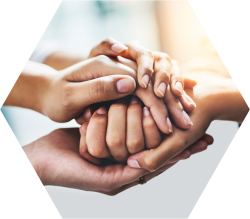
If you are in immediate danger and fear for your safety, dial 911.
If you are in a safe place, please call the Samaritan House 24-hour crisis hotline at (757) 430-2120 or use our new chat feature to interact with a member of our specially trained intake staff.
Signs of Domestic Violence

VIOLENCE DOESN'T DISCRIMINATE - INTIMATE PARTNER VIOLENCE (IPV) IN THE LGBTQ COMMUNITY
Intimate partner violence (IPV) is often framed a something that only happens in heterosexual, cisgender relationships. As a result, there are misconceptions about how LGBTQ persons experience intimate partner violence. Samaritan House is proud to provide support to the LGBTQ community.
Types of Abuse
- Threaten to 'out' you to family, friends or at work.
- Commit physical or sexual violence.
- Control finances or refuse to let you work.
- Blame you for the abuse.
- Threaten or hurt pets, children or other loved ones.
- Blame behavior on being drunk or high.
- Tell you that no one will ever love you.
- Withhold, destroy or control access to medication and hormones.
- Intentionally use your wrong pronoun or name.
- Pressure you into performing unsafe or degrading sex acts.
Statistics
- 44% of lesbian women and 61% of bisexual women, experienced rape, physical violence, and/or stalking by an intimate partner.
- 26% of gay men and 37% of bisexual men, experienced rape, physical violence, and/or stalking by a partner.
- Transgender persons are twice as likely to experience intimate partner violence (IPV).
Support Services
Due to a history of the criminalization and discrimination of LGBTQ communities by law enforcement and health-service providers, many LGBTQ survivors of violence are reluctant to report these incidents. Samaritan House is aware of this issue and operates an LGBTQ Advisory Committee to adequately serve and provide services for anyone who is oppressed or marginalized.
Samaritan House provides LGBTQ focused housing, case management, counseling, advocacy, transportation, medical assistance, food support, job training and more to anyone experiencing violence in any form. Samaritan House offer these services free from discrimination based on , sex, gender identity, gender expression or sexual orientation.




